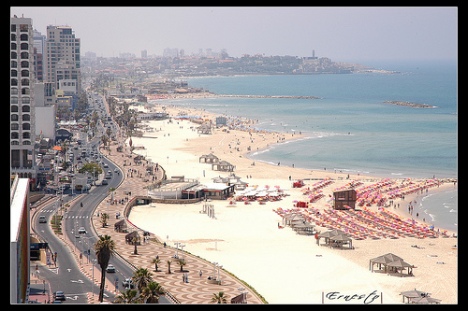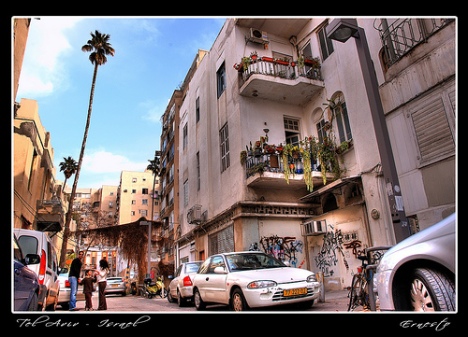
View from the Latin American Tower of the Palace of Fine Arts, Mexico City
For this week’s regional market post we spoke to Ricardo Dadoo, Stern MBA ’84. Ricardo founded and runs Logistics Dadoo in Mexico City, and is a member of Trace International, a Washington D.C.-based organization that specializes in transparency and ethics compliance training for international commercial agents and consultants.
Ricardo was kind enough to field our questions about the MBA in Mexico, and has some great advice for recent graduates who are having trouble planning their career in light of the recession.
CareerMee: How enmeshed is the MBA in Mexican business culture, compared with the US? Have you noticed any trends?
Ricardo: MBAs are part of the business culture and Mexican nationals with a top ten foreign university MBA, and from the top 3 local schools are very much in demand and are considered highly desirable status symbols. They are also better compensated than other MBA degrees.
There are proportionally less MBA holders in Mexico as in the USA, but it is always interesting to participate in discussions between professionals in both countries as to the real value brought by an MBA versus the practical experience of a top college degree holder. In my opinion an MBA provides a fast track in the corporate world here and in the USA, but its value for an entrepreneur is debatable unless, as in my case, one takes the route of paying dues in the corporate world as a way to gain experience prior to starting one’s first business.
MBAs are much sought-after degrees by college kids in Mexico and the country generates highly competitive candidates that get admitted to top schools the world over. Perhaps this is because, in general, they are put in positions of responsibility at a younger age than their foreign counterparts – partly because the Mexican custom is for students to work while they go to college. So there is an edge in terms of practical experience of several years versus, say, US students.
CareerMee: Can you share any insight on the differences between working in Mexico and the US; cultural differences, work conditions, life style?
Ricardo: Mexico’s business culture varies widely among regions. In general, North Mexico, Monterrey and environs is more formal than south Mexico (including Mexico City). Also, working for a serious multinational is better rated than many local companies, publicly-traded included. MBAs coming back home are faced with several dilemmas as starting salaries are substantially less than for MBA graduates that stay in the USA. Also, ethically speaking, there is great pressure to succumb to just the type of behaviour that the program instilled in you to avoid. Productivity is hampered by excessive regulations, lack of rule of law in settling disputes, collusion between politics/businessmen and bureaucrats that have no prior business experience and can’t relate to your legitimate business problems and arguments. If you deal effectively with these and many other issues then Mexico is a good place to do business in, as it’s a huge market and quite sophisticated. And let me add, one can do business ethically in Mexico, and many do. That separates prestigious groups from simply successful ones. In many areas, such as logistics, it is world-class – automobile production and others as well.
- Culturally, we tend to over-commit and under-deliver and finally are poor at meeting deadlines and accepting mistakes. We are friendlier than the US and have a rich cultural legacy that is exemplified by our hospitality and warmth in our business relations. We don’t accept to be corrected in public and our pride/honour can make us walk away from opportunities as a result of shallow misunderstandings.
- Our lifestyles are family oriented and security obsessed, we like to both entertain and enjoy eating out.
- Mexico City is the culture and gastronomical capital of Latin America – that is quite a statement, and I’ll back it up any day: we have the finest restaurants, theaters, museums, concerts of all kinds and we have a liberal culture that is very warm and hospitable. Expats just like it here very much, caveats included.
CareerMee: Can you give us a quick rundown on how the financial crisis has hit Mexico?
Ricardo: The financial crisis hit Mexico in several ways:
1) It lost competitiveness suddenly when major structural reforms were stuck in Congress – not a good follow-up to all the Free Trade Agreements signed
2) Security issues took a toll on certain investment flows
3) It became inward-looking and failed to recognize achievements of countries like India and China as not affecting Mexico
4) No president has a 20 year plan; they stick to their 6-year length of their presidential term so there is little continuity
5) Domestic market grew on credit, not on investment in education and access to a healthy labor market
6) There is an overreliance on the US Market
7) Major areas of the economy are taking a hit: tourism, energy as reserves are diminished, exports, autos, you name it – we are suffering it.
8) Further, we have the lowest growth rates of any major Latin American country, or for that matter of any of the top 15 world economies – in Mexico, GDP will shrink in 2009 by 6-8%.
9) We also have the highest % drop in Direct Foreign Investment Flows in 1st Qtr 2009 among BRIC countries (plus Mexico).
CareerMee: Do you think Mexico could potentially offer better job prospects for class of ’09 MBAs, compared with the US/Europe?
Ricardo: As in all countries, Mexico will always take in a pool of MBAs each year for major corporations in all sectors. As for ‘09 in particular, there are less openings for Mexican graduates and less pay so I would encourage recent Mexican graduates to try and obtain foreign work experience before returning here.
On the flip side, there are relatively few non-Mexican MBA holders that come here in search of jobs, and while supply of jobs is down, I would still encourage them to get their overseas work experience in Mexico, particularly in the tourism, industrial and financial industries where they could then return for a better position in their home countries. This is especially valid if you can find a position in a foreign-based company which has its HQ in your home country. For example a Frenchman with an MBA from a top European or US school could try to find work here with L’Oreal, an American with Starwood or P&G, or a Canadian at ScotiaBank. All I know is that top executives of companies similar to those are assured a top slot at HQ after excelling at their job in Mexico. Sometimes even the CEO job itself for Mexico provides an excellent training ground, and a microcosm of how a MNC functions worldwide – from the sophistication of top-level finance, to how to deal with a complex supply chain, to how to protect yourself, your family and your employees from security mishaps.
Foreign-national MBAs need to be sponsored by a company whether a local or a foreign-based MNC. It’s not difficult; it just has to comply with work visa bureaucracy, and is very similar to USA’s immigration rules.
Thanks a lot for the great insight and advice, Ricardo! Readers – have you considered heading to Mexico for work? Any questions you’d like to ask Ricardo? Let us know in the comments or you can contact him directly “rdadoo/at/logisticsdadoo/dot/com”.
Pic courtesy of flickr user tinou bao
Filed under: MBA Job Markets, Regional MBA Market | Tagged: Business Schools, CSR, Global Business, MBA job market, mba jobs, mba prospects, mba recruitment, Mexico, Mexico City | 2 Comments »











